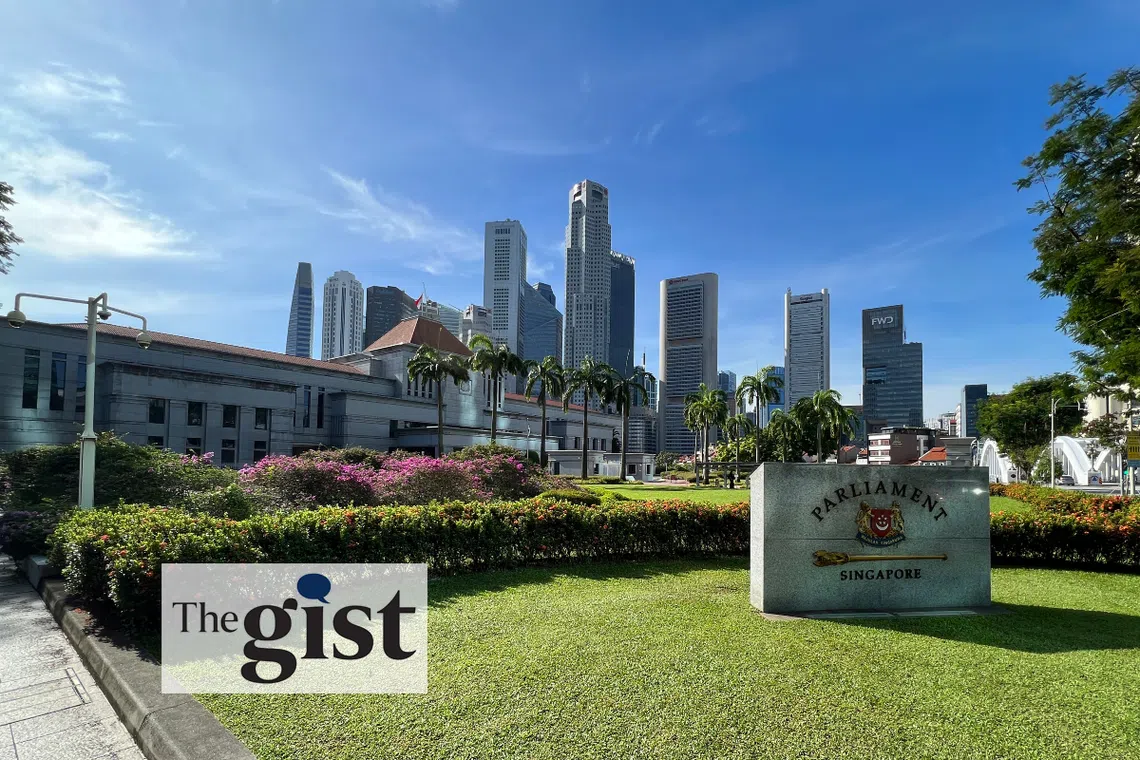The gist: Scams, haze and scrapping GRCs debated in Parliament
Sign up now: Get ST's newsletters delivered to your inbox

MPs debated a wide range of issues in Parliament on Wednesday.
PHOTO: ST FILE
SINGAPORE – From combating scams to weathering the prospect of haze and abolishing the group representation constituency (GRC) system, MPs debated a wide range of issues in Parliament on Wednesday.
Here are the key takeaways:
Haze and heat sanctuaries
The Government is considering using residents’ committee (RC) centres and air-conditioned rooms in community clubs during haze episodes so that vulnerable groups such as seniors can take refuge in them, said Minister for Sustainability and the Environment Grace Fu.
The ministry will also consider using these spaces for vulnerable groups to take respite from the heat, said Ms Fu in response to Workers’ Party MP He Ting Ru (Sengkang GRC).
Why it matters:
The ongoing dry season is expected to be the hottest and driest since 2019, and it could extend to October with the onset of two climate phenomena – El Nino and the Positive Indian Ocean Dipole. Both phenomena, which bring hotter weather to South-east Asia, are likely to set in over the next one or two months.
Singapore’s last transboundary haze episode was in 2019, also an El Nino year. The country experienced unhealthy air quality over a few weeks that year. In June, the Singapore Institute of International Affairs said there was a high risk of severe haze occurring in the region in 2023.
Law to stop scams and online crimes upstream passed
A law was passed that allows the Government to order individuals, entities and Internet service providers, among others, to remove or block access to content suspected of being used to commit crimes.
Second Minister for Home Affairs Josephine Teo said the law will allow authorities to take the “kiasu” (Hokkien for “fear of losing out”) response and stop online criminal harms such as scams before they reach many people.
A party that first posts the criminal content online could be given a stop communication direction to remove the post, so that it is not accessible in Singapore, or an online service provider could receive a disabling direction to disable access to specified content, like a post or a page, on its site to prevent people in Singapore from viewing it.
Why it matters:
Mrs Teo said there is growing recognition that proactive approaches are needed to prevent such harms. Britain, the European Union, Germany, and Australia have or are introducing new laws in this regard.
Scams and cybercrime continue to be a key concern. The number of scam and cybercrime cases increased by 25.2 per cent to 33,669 in 2022, compared with 26,886 cases in 2021, said the police in their annual crime statistics earlier this year.
The total amount lost to all scams increased by 4.5 per cent to $660.7 million in 2022, from $632 million in 2021.
READ MORE HERE: New law passed to remove online content that is criminal or harmful
PSP’s bid to abolish GRCs quashed
A motion on abolishing GRCs was struck down by Parliament.
The private member’s motion was filed by Progress Singapore Party Non-Constituency MPs Leong Mun Wai and Hazel Poa, who said that GRCs have moved so far away from their original purpose, to ensure minority representation, that they should be done away with.
The system has entrenched the dominance of the ruling People’s Action Party, and Singapore should consider other ways to ensure minority representation, they added.
They proposed a Non-Constituency MP scheme for minority MPs and proportional representation.
Why it matters:
Education Minister Chan Chun Sing said that while no system is perfect, the GRC system guarantees that Parliament will always be multiracial and representative of the make-up of society.
The GRC system also ensures that Singapore’s politics does not become racially charged as it takes racial politics out of the electoral contest.
“To support this motion is to leave to chance the emergence of racial politics and forgo our continued progress towards a system where race is not to be a determining factor in electoral contests,” said Mr Chan.
READ MORE HERE: Parliament rejects PSP motion to abolish GRC system
If you have a few more minutes…
Opinions versus facts under Pofma
Leader of the Opposition Pritam Singh reiterated the Workers’ Party’s opposition to previous legislation, including the Protection from Online Falsehoods and Manipulation Act (Pofma), and questioned if it is in the best interests of Singapore citizens that the Government blocks not only an article the Government deems false but an entire publication.
Second Minister for Home Affairs Josephine Teo said it was “not quite a correct characterisation” to say that the Government decides what is the truth.
“Pofma deals with false statements of fact. These false statements of facts can be proven. There has to be a basis for making those allegations,” said Mrs Teo.
She added that people are free to make opinions, but if one says something that is factually incorrect, and it involves public interest, Pofma can be considered.
Mrs Teo noted that the vast majority of Pofma directions have been complied with in full and the original content remains fully accessible.
Postage rate adjustments being studied
The Government will consider allowing Singapore Post (SingPost) to introduce postage rate adjustments in the future to better reflect the cost of letter mail business, said Senior Minister of State for Communications and Information Tan Kiat How.
This comes as rapid digitalisation has led to a sharp decline in domestic letter volumes, making it challenging for SingPost to continue running a viable business, he said.
The adjustments will be of a “sufficient degree” to allow SingPost’s business model to remain viable without requiring direct government funding, he added.



